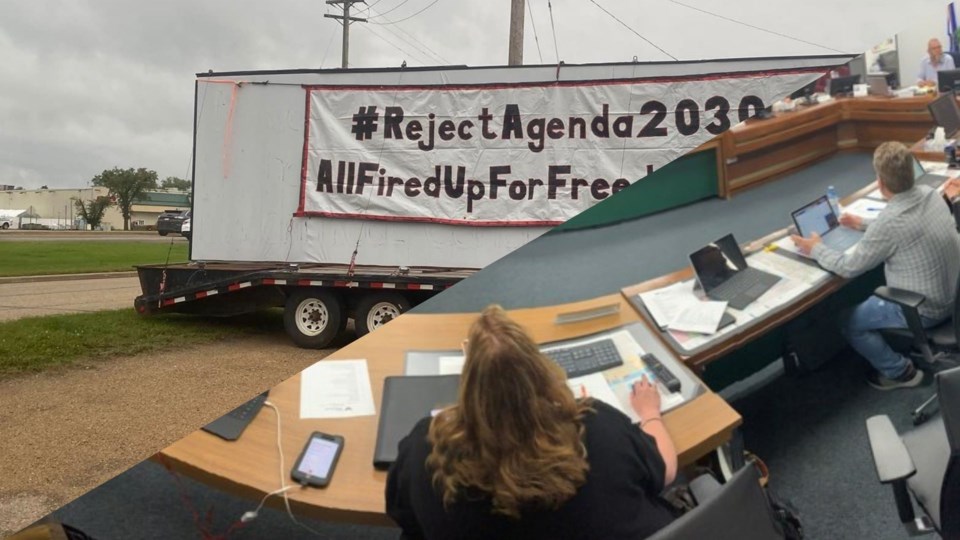This article is the first in a four-part series on how conspiracy theories and theorists are impacting municipal governments.
Part 2: Rainbow crosswalks and the 2030 Agenda
Part 3: Democratic deficit and support for Canadian institutions
In his time in municipal government, Paul McLauchlin, reeve of Ponoka County and president of the Rural Municipalities of Alberta, has heard it all. That his colleagues are shills for the World Economic Forum (WEF). That he’s really doing the bidding of the United Nations.
McLauchlin can laugh about these accusations, saying the majority of constituents recognize the work of municipal leaders revolves around infrastructure and the provision of goods and services.
But there is a fairly loud, and increasingly hostile, minority spurred on by misinformation and conspiracy belief who he says have caused “a lot of harm to municipal politics in some circles.”
“It's a very tough time to be a municipal leader in this world of polarized toxicity,” he said.
“It's a pretty big mental health strain on people when you're dealing with the level of bullying and aggressiveness you're seeing out there.”
Municipal leaders across Canada have been subject to a wave of harassment, from nuisance phone calls to groups hijacking protests to threats of violence.
On the lower end of seriousness, having to counter conspiracy theories and other forms of misinformation takes time away from the material concerns of municipal councils. At the other extreme, belief in a global conspiracy creates an environment where anti-authority, xenophobic, and outright antisemitic groups can gain influence.
The antagonistic political culture is also contributing to staff turnover in municipal government. In February, Quebec launched a helpline for elected officials following hundreds of resignations. And the average tenure for chief administrative officers in Alberta is now less than a single council term.
“Many of the folks that I’ve seen be bullied; all they're trying to do is make land-use decisions on behalf of their communities. And it's quite sad that we're at this stage,” McLauchlin said.
Land use and development decisions are at the heart of municipal government. In the mirror world of conspiracy theorists, municipal planning is at the core of the "globalist blueprint" that is Agenda 21, or the 2030 Agenda for Sustainable Development.
At the UN Conference on Environment and Development in Rio de Janeiro, Brazil in 1992, leaders of 178 nations signed a document known as Agenda 21. The planning paper contains goals for sustainable development, conservation, and combating global poverty. It is not a treaty and has no enforcement mechanisms or penalties.
Despite its limited scope and power, the John Birch Society and other radical right groups have recast Agenda 21 as the linchpin in a secret plot to impose a totalitarian one-world government that would erode national sovereignty, decimate rural populations, and enact mass depopulation schemes.
Building on decades of work that followed the 1992 Rio de Janeiro summit, an updated framework of 17 development goals, the 2030 Agenda for Sustainable Development, was adopted by UN member states in 2015, and incorporated into existing conspiracy theories soon after.
The all-encompassing Agenda 21/2030 theory is now entrenched in online conspiracy culture, where it serves as an explanation for many world events, from pandemic immunization efforts to municipal council decisions on public transit or the colour of crosswalks.
In some ways, the convergence of misinformation and local politics is a “post-COVID hangover,” but the issue has been building for a while, McLauchlin said.
“I think that there is a small vocal minority that are being fed algorithms through their social media channels. And those algorithms are based upon memes that are not tied to the reality of what is going on,” he said.
“The struggle of democracy we have right now is that fact and truth have become questionable. And some people start to believe in things that aren't really based upon fact.”
A rainbow crosswalk in Westlock became a flashpoint for a local activist claiming it was part of the United Nations’ 2030 Agenda. Read more in part 2.



